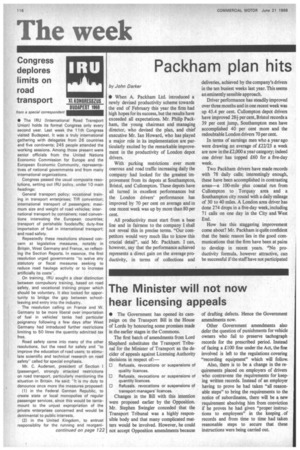Congress deplores limits on road transport
Page 118

If you've noticed an error in this article please click here to report it so we can fix it.
from a special correspondent • The IRU (International Road Transport Union) holds its formal Congress only every second year. Last week the llth Congress visited Budapest. It was a truly international gathering with delegates from 26 countries and five continents; 245 people attended the working sessions. Among those present were senior officials from the United Nations Economic Commission for Europe and the European Economic Community, representatives of national governments and from many international organizations.
Congress passed the usual composite resolutions, setting out IRU policy, under 10 main headings: General transport policy; vocational training in transport enterprises; TIR convention; international transport of passengers; maximum size and weight of road vehicles; international transport by containers; road conventions interesting the European countries; transport of perishable foodstuffs; duty-free importation of fuel in international transport; and road safety.
Repeatedly these resolutions showed concern at legislative measures, notably in Britain, West Germany and France, so reflecting the Section Reports. In essence, the first resolution urged governments "to waive any statutory or fiscal measurias seeking to reduce road haulage activity or to increase artificially its costs".
On training, IRU sought a clear distinction between compulsory training, based on road safety, and vocational training proper which should be voluntary. It also looked for opportunity to bridge the gap between schoolleaving and entry into the industry.
The resolution calling on France and W. Germany to be more liberal over importation of fuel in vehicles' tanks had particular poignancy following a few days after West Germany had introduced further restrictions limiting to 50 litres the quantity admitted tax free.
Road safety came into many of the other resolutions, but the need for safety and "to improve the education of road users; to stimulate scientific and technical research on road safety" called for special emphasis.
Mr. C. Aucierset, president of Section I (passenger), strongly attacked restrictions on road transport, particularly mentioning the situation in Britain. He said: "It is my duty to denounce once more the measures proposed: (I) in the Federal German Republic, to create state or local monopolies of regular passenger services, since this would be tantamount to the unjust expropriation of the private enterprises concerned and would be detrimental to public interests, (2) in the United Kingdom, to entrust responsiblity for the running and reorganicontinued on page 122








































































































































































































